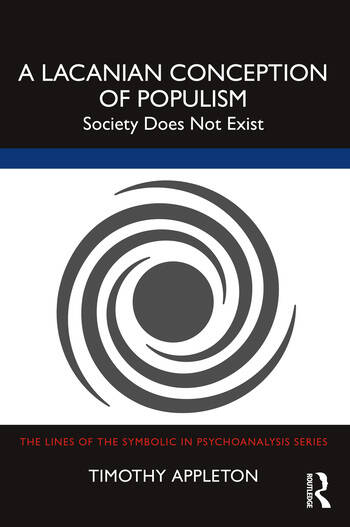A Lacanian Conception of Populism: Society Does Not Exist

Book Details
- Publisher : Routledge
- Published : 2023
- Cover : Paperback
- Pages : 112
- Category :
Lacanian Psychoanalysis - Catalogue No : 97258
- ISBN 13 : 9781032557182
- ISBN 10 : 1032557184
Reviews and Endorsements
Appleton’s book is much more than just a psychoanalytic interpretation of populism – it is a politically-engaged reading which intervenes in its subject and opens up new ways of emancipatory struggle. To paraphrase the best-known line of Marx: philosophers have hitherto only interpreted populism in various ways; the point of Appleton’s book is to change populist practice itself.
Slavoj Žižek, International Director, Birkbeck Institute for the Humanities
Staging an informed, challenging and timely choreography between different strands of contemporary critical political theory (drawing on Rancière, Badiou, Zizek and others), Appleton manages to show populism in a new light. By enlisting psychoanalysis to envisage politics anew, he articulates an original contribution to the Laclau and Mouffe-inspired orientation.
Yannis Stavrakakis, Professor of Political Discourse Analysis, Aristotle University of Thessaloniki, and author of The Lacanian Left
A well thought-out and provocative book on populism which is a must for contemporary debates on the subject.
Marina Prentoulis, Senior Lecturer in Media and Politics, University of East Anglia, and author of Left Populism in Europe
Appleton is an original thinker who makes a significant contribution to the field of post-Laclaudian theory, inspirational for the understanding of deepening affective hegemonic struggles and populist politics.
Emilia Palonen, Lecturer in Politics, University of Helsinki
A Lacanian Conception of Populism is a book that intervenes in a lucid and original way in today’s politico-theoretical scene. It demonstrates the ideological (liberal) bias of those who disdain populist theory, points out the limits of discourses centered on the figure of the proletariat and makes the people of the populist movements the axis of its philosophical reflections. Appleton achieves this aim via a novel and ruptural break with the theory of populism itself: he distances himself from Laclau and Mouffe, abandons the concept of hegemony and, in its place, opts for a populism of singularities qua political imagining that is open to the future.
Luciana Cadahia, Lecturer in the Pontifical Catholic University of Chile, co-author of Seven Essays on Populism
The political theory of populism is a somewhat impenetrable jungle. Tim Appleton orientates us and guides us through this terrain, discovering new places for us. The book contains original and interesting ideas about the ideology of populism, the relationship between populism and leadership and between populism and nationalism, and also offers a new vision of the role of antagonism in politics. This work will be an unmissable reference in the debates on populism.
Ignacio Sánchez-Cuenca, Profesor of Political Science, Carlos III University, Madrid, author of The Left: End of (a) Cycle (Catarata)

